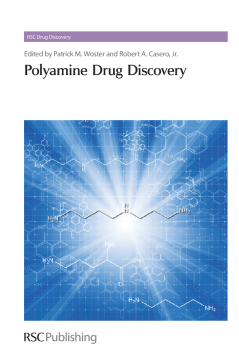
Additional Information
Book Details
Abstract
Polyamines are ubiquitous molecules that are involved in a number of important cellular processes. Aberrations in their function or metabolism play a role in diseases such as cancer and parasitic infection. A number of validated drug targets have been identified, including enzymes in the polyamine biosynthetic and catabolic pathways and the S-adenosylmethionine synthetic and salvage pathways. Polyamine Drug Discovery is the first comprehensive volume to cover all aspects of the design and development of potential therapeutics targeting polyamine metabolism. The book details research progress from 1975 to the present date and discusses the design and use of polyamine metabolism inhibitors as therapeutic agents. Various polyamine-containing drugs are described that can be used in chemotherapy, and as treatments for infections including trypanosomiasis, leishmaniasis and malaria. Finally, the roles of polyamine analogues in chemoprevention, polyamine-containing vectors for gene delivery, and the design of polyamine-based epigenetic modulators are detailed. Each chapter addresses a different aspect of polyamine drug discovery and all are written by medicinal and biological chemists with particular expertise in developing agents that modulate polyamine metabolism or function. The book will increase the visibility of polyamine drug discovery among pharmaceutical researchers and provide a valuable reference for everyone working in the field.
Patrick M. Woster, Ph.D. is Professor and Center for Economic Excellence Endowed Chair in the Department of Pharmaceutical and Biomedical Sciences at the Medical University of South Carolina. He is a medicinal chemist with an interest in the synthesis of molecules that modulate polyamine metabolism or chromatin remodeling as potential antitumor agents. Dr. Woster also maintains a program in antiparasitic drug discovery with a particular emphasis on malaria and trypanosomiasis. He has produced a number of inhibitors that target enzymes in the polyamine biosynthetic pathway, and synthesized the first unsymmetrically substituted alkylpolyamine analogues. Molecules developed in the Woster laboratory have been shown to produce dramatic effects on a variety of tumor cells by initiating apoptosis, binding to DNA and by producing epigenetic changes in gene expression. Robert A. Casero, Jr., Ph.D. is a Professor of Oncology in the Johns Hopkins University School of Medicine. Dr. Casero is a molecular pharmacologist who has spent most of the last 30 years studying the role of polyamines in normal and tumour cell growth, and devising strategies to target polyamine function and metabolism for therapeutic benefit. His laboratory was responsible for cloning several genes involved in human polyamine catabolism; genes whose expression are thought to play a role in determining cellular responses to specific polyamine analogues.
